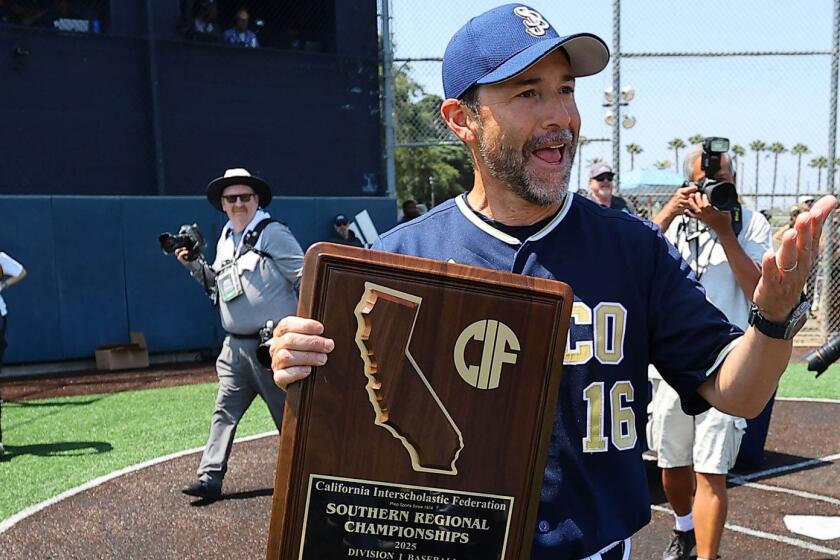The winners of Camp Kilpatrick
- Share via
It might be considered the sports equivalent of settling for the girl with the “nice personality” after you’ve been dumped by the homecoming queen.
But for the Mustangs of Malibu’s Camp Kilpatrick, the Sportsmanship Award it received is a fitting testament to a basketball season whose success is not measured only by games won and lost.
Kilpatrick is the Los Angeles County probation camp whose football program was immortalized in the 2006 movie “Gridiron Gang.” Its basketball team had a stab at glory this month, when it won the championship of the region’s small schools division.
But four games into the state playoffs -- four victories, by an average margin of almost 30 points -- league officials discovered that one Kilpatrick player had exhausted his high school eligibility. That meant a string of forfeited games that cost the team its title and playoff berth.
The adults had made the record-keeping error, but it was the boys who shouldered the loss -- boys whose names I can’t use because they’re wards of the court, but whose hard work deserves a public shout-out.
“They worked hard, did everything we asked,” Mustang coach Kurt Keller said. “And these are kids who have been told all their life they’re doing things wrong.”
::
The idea of playing against a bunch of junior criminals didn’t sit well in some corners of the Delphic League, made up mostly of religious schools and exclusive independent campuses.
Coaches I spoke with this week admitted they’d heard grumbling that “these kids are troublemakers. . . . Why are we rewarding them, letting them come into our gym?”
Some players were nervous, figuring “these guys are from the streets,” said Sierra Canyon coach Colin Jamerson. “They worried: What happens if we get into an argument or confrontation on the court?”
But the Mustangs toed the line, and more. “They were polite, shook hands, were all ‘yes sir’ ‘thank you,’ ” Jamerson said. “The kids, the fans, their family members . . . everybody was respectful. We never experienced any problem when they played us.”
The problems played out behind the scenes. When practice began in mid-November, Keller’s roster bristled with attitude problems, gang rivalries and racial tensions.
Players came and went. New probationers arrived; others finished their terms and went home; some broke team rules and were kicked off. Only three of the original 13 were there when the season ended. “One night I went to bed [having] 10 players and woke up with six,” said Keller.
The Mustangs had to rely on simple tactics, like a menacing full-court press that overwhelmed opponents and forced turnovers. “We worked hard to get the ball,” Keller said. “Rebound, fast-break and we’re off and running.”
Kilpatrick hasn’t had a gym since the 1994 Northridge earthquake. The team practiced on asphalt with rubber balls. They never had a home court advantage.
Still, every kid had someone in the stands cheering him on. Their families traveled to games in Banning, Ojai, Pasadena. Even camp employees showed up, their families and packed coolers in tow.
“They would say ‘I haven’t done this since Little League, since Pop Warner,’ ” Keller said of the parents. It was a respite from an unpleasant routine of court appearances and strained weekend visits.
And it was uplifting to see how well their boys were received by strangers, on the court and off.
“I was kind of embarrassed when he got in trouble,” admitted Stephanie Sydow, whose son was known for his wicked three-pointers. She and her husband never missed a game.
“I always kept my ears open in case I heard somebody say ‘Look at those jailbirds,’ ” she said. “But I never did. Not once.”
::
If I had a chance to ask the boys what this season taught them, I imagine they’d say the value of hard work; of rising above mistakes, making the best of every chance, shaking off bad calls. Good lessons, all.
Neither Keller nor his players knew it, but their opponents had been taking note. After every game, coaches rate the opposing team on sportsmanship standards, such as self-discipline, responsiveness to referees, encouragement of teammates and conduct toward opponents.
Kilpatrick wound up as the league’s highest-rated squad.
Their attitude, as much as their effort, helped them accrue what really mattered in this up-and-down season of basketball:
“They started to care about people,” Keller said. And they realized people cared about them.
Like the businessman who met them at McDonald’s and was so impressed by their demeanor “he handed out his business cards,” Keller said, “and told them to call about jobs when they get out.”
And the parents at Village Christian, who served them dinner after every visit. “They’re kids who made mistakes, and they’re paying the consequences,” Coach Reggie Richardson said. “That’s no reason for us not to love them.”
That helped them learn to see themselves as something more than troublemakers, Keller said. “They started to hold each other accountable.”
Gone was the tough-guy mode from the early days in the team van: talk that centered on gang ties and street-wise schemes. By the season’s end, they were more interested in the intricacies of the give-and-go.
Just boys, talking about basketball. Who lost a championship, but gained much more.
More to Read
Get our high school sports newsletter
Prep Rally is devoted to the SoCal high school sports experience, bringing you scores, stories and a behind-the-scenes look at what makes prep sports so popular.
You may occasionally receive promotional content from the Los Angeles Times.






